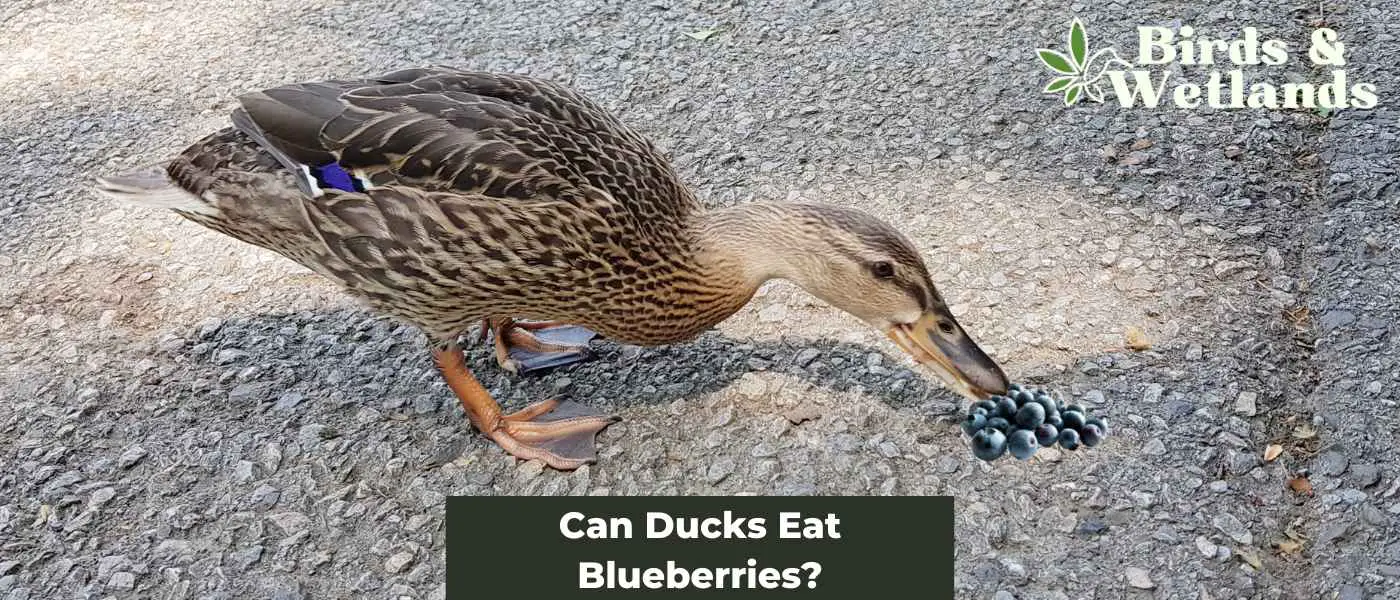Ducks are delightful creatures to watch, and feeding them can be a fun activity for both children and adults. However, not all human foods are safe for ducks to consume.
Blueberries, with their sweet taste and numerous health benefits, are a popular snack for humans.
But can ducks eat blueberries without any harmful effects?
Yes, ducks can eat blueberries as an occasional treat. Blueberries are a good source of vitamins, minerals, and antioxidants, making them a nutritious snack for ducks. Ensure that the blueberries are ripe and clean, and offer them in moderation. Offer blueberries alongside other safe fruits and vegetables to provide a balanced and varied nutritional intake.
Key Takeaways on Can Ducks Eat Blueberries
- Ducks can eat blueberries as part of their diet, but they should only be given in moderation.
- Blueberries are a good source of antioxidants and nutrients that can benefit a duck’s health.
- It is important to ensure that the blueberries given to ducks are fresh and have not been treated with any chemicals or pesticides.
- Blueberries can be a tasty and nutritious treat for ducks, but they should not make up the majority of their diet.
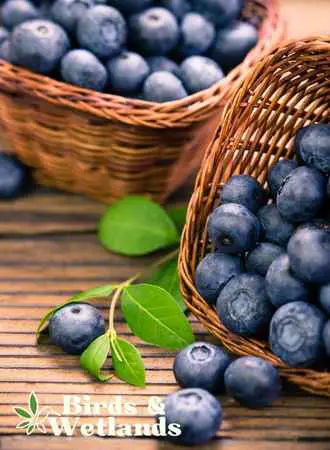
How does eating blueberries benefit ducks?
Blueberries provide many health benefits for your pet ducks. Not only do they taste good, but they are packed with vitamins and minerals. Blueberries are a source of carbohydrates and contain beneficial minerals such as zinc and iron, which help keep a duck’s feathers in top condition.
Other antioxidants found in blueberries help ducks stay healthy by boosting their immunity and protecting against disease.
Adding blueberries to your pet duck’s diet promotes mental health because it improves cognitive function, helping to keep its brain sharp as ever.
Other vitamins in blueberries included vitamin E, vitamin B6 and vitamin K1.
Vitamin E keeps the duck’s skin and feathers healthy and boosts its immune system. Vitamin E deficiency can lead to wry neck on affected birds which can be fatal if left untreated.
Vitamin B6, also known as pyridoxine, helps with the metabolism of proteins and carbohydrates. It also plays a role in maintaining proper brain function, healthy growth and producing red blood cells.
Vitamin K helps with blood clotting and the metabolism of proteins. It also plays a role in maintaining bone health.
While ducks can produce their own vitamin C, they can still benefit from the vitamin C content of blueberries.
If you are at the local park and want to feed wild ducks, serve blueberries to them. Most local ducks enjoy the sweet taste of blueberries. Serving blueberries to ducks is better than feeding ducks plain popcorn, bread and other junk food.
Can baby ducks eat blueberries?
Ducklings eat blueberries, and feeding blueberries can be a great way to provide them with some important nutrients and encourage healthy development.
Blueberries contain many vitamins, minerals, and antioxidants that are beneficial for ducks of all ages but especially for growing ducklings. The juicy texture and sweet flavor of the berry will also make it an enjoyable snack.
When feeding blueberries to baby ducks, it is important to keep safety in mind. Always wash the blueberries thoroughly before feeding them to your ducklings or young ducks, as they could contain bacteria such as E. coli or Salmonella if not cleaned properly.
Additionally, you should only feed fresh or frozen blueberries. Avoid canned blueberries since they may contain added sugar and other preservatives that are not good for your ducklings’ diet.
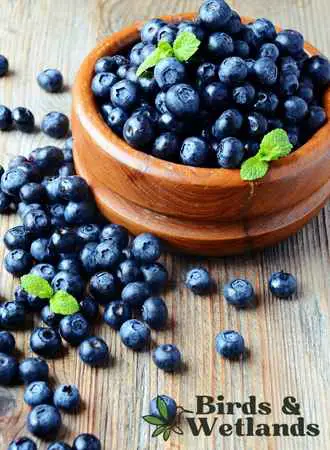
Can ducks eat frozen blueberries?
Yes, ducks can eat frozen blueberries. Defrost the frozen blueberries first before feeding them to your ducks.
Can ducks eat blueberries’ seeds?
Blueberry seeds are small and have a mild, nutty flavor. Ducks are known to enjoy eating blueberries, and this includes the seeds.
When ducks eat blueberries, they can’t separate the seeds from the fruit. The seeds pass through their digestive system and then get excreted in their droppings. This helps spread the blueberry plants across different locations as they often take root wherever ducks leave them behind.
These seeds can also provide important nutrients for ducks, including fatty acids, protein, magnesium, phosphorus, zinc and several other vitamins and minerals. Thus, adding blueberry seeds to a duck’s diet can benefit its health.
Unlike apple seeds and stone fruit pits, there aren’t any major risks associated with letting ducks eat the seeds. Regardless, blueberries should be given as an occasional treat.
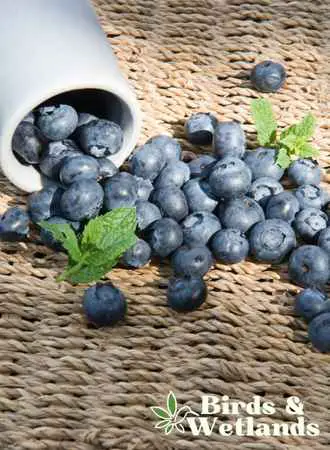
Can ducks eat blueberry muffins?
No, it is better to avoid feeding ducks a blueberry muffin. Most baked goods contain sugar and other ingredients that are not suitable for animal consumption.
Can ducks eat blueberry pie?
Like blueberry muffins, ducks should not be eating blueberry pies. A blueberry pie may contain too much sugar, which is unhealthy for ducks.
High amounts of sugar can lead to obesity in ducks, which carries the risk of heart disease and other serious health issues. Ducks and other birds can’t digest high amounts of sugar, which can cause digestive distress and other uncomfortable symptoms.
Additionally, other ingredients present in blueberry pies may not be suitable for ducks. For example, a pie crust often contains large amounts of butter and unhealthy fats, while fillings may include artificial flavors and preservatives that can be harmful to duck digestion or development.

How to feed ducks blueberries
Ducks enjoy eating blueberries. Even the ducklings enjoy a juicy treat, especially when served fresh. Blueberries and other fruits in the berry family are good alternatives to junk food such as popped corn.
Whether you raise ducks and other poultry in your backyard or like feeding ducks and other bird species at your local park, here are some of the best ways to serve and prepare blueberries for ducks.
- Wash the blueberries properly to remove dirt and dust from the skin.
- You can feed them whole or cut them into halves or quarters.
- You can serve blueberries to ducks in a bowl or throw them out in the yard or pond and watch ducks swarm them.
- It’s not a good idea to mix blueberries with citrus fruits. Vitamin C is good for your pet duck but too much of it can interrupt the ability of your bird to absorb calcium which can result in thin-shelled eggs.
- Adult ducks love leafy greens such as cabbage and lettuce. You can mix this healthy fruit and other berries with vegetables to create a tasty treat and a well-balanced diet.
- You can feed blueberries along with stone fruits provided you remove the seeds and pits, leaving only the flesh.
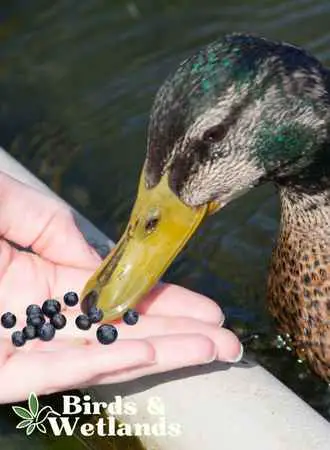
How often can ducks consume blueberries?
There’s no doubt that blueberries can be a good addition to your duck’s diet. However, too many blueberries can also affect your duck’s health, so feeding them sparingly or only on special occasions is extremely important. Ducks love to eat dessert but they shouldn’t have to in every meal.
Other Similar Foods to Feed Ducks
| Apples | Can Ducks Munch on Apples? |
| Bananas | Are Bananas Good for Ducks? |
| Blueberries | Feeding Ducks Blueberries |
| Cantaloupe | Cantaloupe Treats for Ducks |
| Cherries | Can Ducks Enjoy Cherries? |
| Grapes | Are Grapes Safe for Ducks? |
| Lemons | Sour Citrus for Ducks? |
| Mango | Tropical Delight for Ducks |
| Oranges | Citrus Treats for Ducks |
| Peaches | Juicy Peaches for Ducks |
| Pears | Pears: A Duck’s Delight? |
| Strawberries | Strawberry Treats for Ducks |
| Tomatoes | Can Ducks Eat Tomatoes? |
| Watermelon | Refreshing Watermelon for Ducks |
Best Duck Feed Pellets
Are you a duck owner looking for the perfect feed to keep your feathered friends happy and healthy? Look no further than Purina Duck Feed Pellets! With their nutritionally balanced formula and high-quality ingredients, these pellets are the ultimate solution for providing your ducks with the nutrition they need to thrive.
Pros
- Complete Nutrition: Purina Duck Feed Pellets are nutritionally balanced to provide all the essential vitamins and minerals that ducks need to stay healthy and strong.
- Easy to Digest: The pellets are specially formulated to be easy to digest, which makes them ideal for ducks of all ages.
- Promotes Growth and Development: With its balanced nutrition formula, Purina Duck Feed Pellets are designed to support healthy growth and development in ducks.
- Suitable for All Breeds: Whether you have domestic ducks or wild ducks, Purina Duck Feed Pellets are suitable for all breeds of ducks.
- Trusted Quality: Purina has been producing high-quality animal feed for over 100 years, so you can trust that your ducks are getting the best possible nutrition with Purina Duck Feed Pellets.
Cons
- Cost: Compared to other types of duck feed on the market, Purina Duck Feed Pellets can be slightly more expensive. However, many customers feel that the high-quality ingredients and balanced nutrition formula are worth the extra investment.
- Pellet Size: Some customers have noted that the pellet size of Purina Duck Feed Pellets can be quite large, which may not be suitable for smaller or younger ducks. However, many customers have reported that the pellets can easily be broken up or soaked in water to make them easier to eat.

